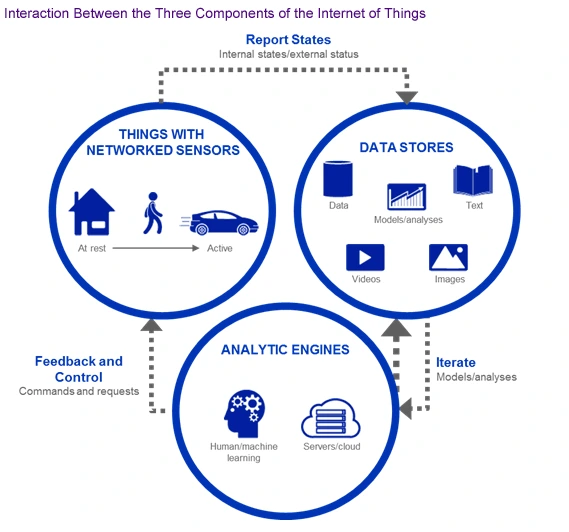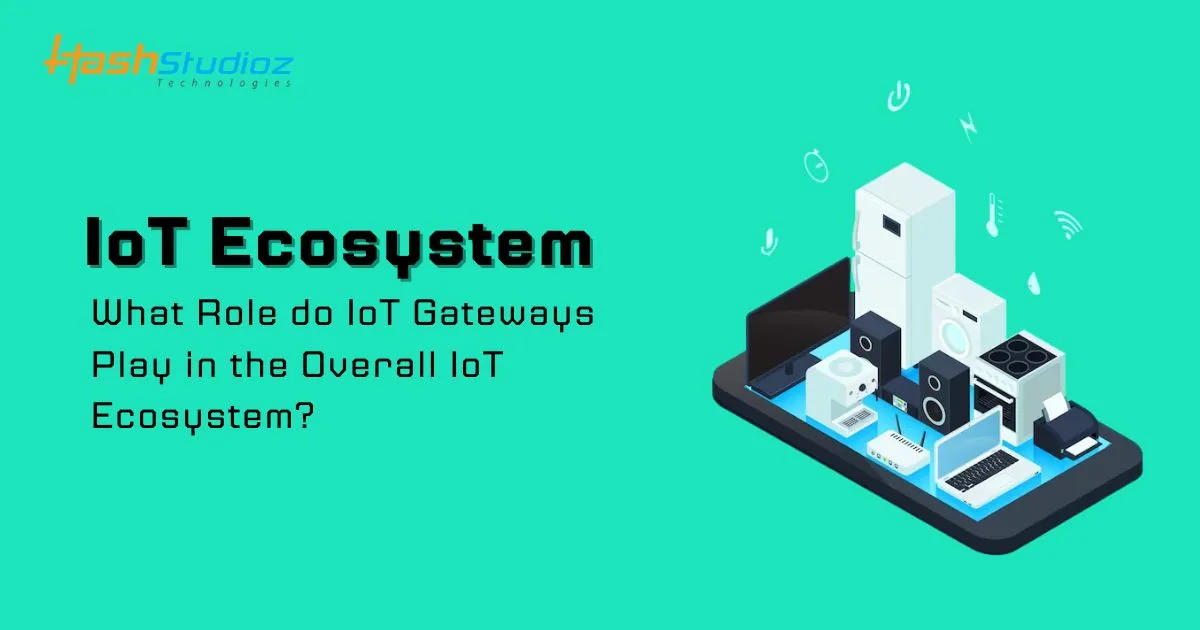In a world brimming with technological marvels, the Internet of Things (IoT) has emerged as a true game-changer, transforming how we interact with data and technology in our everyday lives. We’ve grown accustomed to the magic of smart thermostats regulating our home temperatures and wearable fitness trackers monitoring our well-being. But behind these everyday wonders lies an unsung hero: the IoT gateway.
In this captivating exploration, we’ll unveil the pivotal role that IoT gateways play in the grand tapestry of the IoT ecosystem, and how they orchestrate the symphony of seamless communication and functionality among IoT devices.
Table of Contents
What is an IoT Gateway?
Imagine a translator for all your smart devices at home. That’s kind of what an IoT Gateway is! It’s a central hub that connects all your various internet-connected things, like smart speakers, thermostats, and security cameras, to the internet. Here’s a breakdown:
- Connects devices: The gateway acts like a bridge between your devices and the internet. It allows them to talk to each other and send information back and forth.
- Translation service: Many devices use different languages, well, different ways of communicating (protocols). The gateway translates between them so everything can understand each other.
- Data manager: The gateway can also do some housekeeping. It can collect data from your devices, clean it up a bit, and send it to the internet, where apps and services can use it.
Understanding the IoT Ecosystem
Before we dive deeper into the IoT gateway’s world, let’s take a moment to unravel the broader IoT ecosystem. There are four main components of the IoT ecosystem:


The Role of IoT Gateways
Now that we have a basic understanding of the IoT ecosystem let’s delve deeper into the role of IoT gateways and why they are so crucial.

- Data Aggregation and Pre-processing
IoT devices generate vast amounts of data. Without proper management and filtering, this data can quickly overwhelm networks and cloud services. IoT gateways act as data aggregators, collecting information from multiple devices in proximity. They can preprocess and filter this data before sending it to the cloud. This pre-processing reduces irrelevant or redundant data, improving overall system efficiency and saving bandwidth and cloud storage costs.
- Protocol Translation
IoT devices often use different communication protocols depending on the manufacturer and application. For example, one device may connect to Wi-Fi, while another uses Bluetooth Low Energy (BLE). IoT gateways can translate these various protocols into a unified format, making it easier for the cloud platform to process the data. This protocol translation ensures seamless communication between heterogeneous IoT devices.
- Edge Computing
Edge computing is a critical component of the IoT ecosystem, enabling data processing and analysis at the device’s edge rather than in the cloud. IoT gateways can perform edge computing tasks, allowing real-time decision-making and reducing latency. For example, in industrial settings, IoT gateways can analyze sensor data locally to detect anomalies or issues without waiting for data to be sent to the cloud and back.
- Security and Data Privacy
Security is a top concern in IoT deployments. IoT gateways play a crucial role in securing data transmission and device authentication. They can implement encryption and authentication protocols to protect data in transit, ensuring sensitive information remains confidential and secure. Additionally, gateways can control access to devices, preventing unauthorized access and security breaches.
- Offline Functionality
Not all IoT devices have continuous internet connections. IoT gateways can store data locally, allowing devices to continue functioning even when temporarily disconnected from the cloud. Once the connection is restored, the gateway can transmit the stored data to the cloud for analysis, ensuring data continuity and preventing data loss.
- Scalability and Flexibility
IoT ecosystems are dynamic and expand over time. IoT gateways provide scalability and flexibility by allowing new devices to be added seamlessly. They can adapt to different communication protocols and device types, making it easier for businesses to integrate new IoT devices into their existing infrastructure.
- Cost Optimization
Optimizing costs is a significant concern for IoT deployments. IoT gateways can reduce operational costs by filtering and processing data locally before it reaches the cloud. This means businesses can make better use of their cloud resources, reduce data storage costs, and minimize the volume of data transmitted over cellular networks, which can be expensive.
- Device Management
It can be challenging to manage a large number of IoT devices. IoT gateways often include device management functionalities, allowing administrators to monitor device status, update firmware, and troubleshoot issues remotely. This simplifies IoT deployment maintenance and upkeep.

Real-World Applications of IoT Gateways
To better understand the importance of IoT gateways, let’s explore some real-world applications where they play a critical role:
- Smart Cities: Paving the Way for Urban Innovation
In the realm of smart cities, IoT gateways gather data from sensors across urban landscapes. Traffic, air quality, waste management—they monitor it all. IoT gateways process and send this data to central platforms, shaping better city services and decisions.
- Industrial IoT (IIoT): Revolutionizing Manufacturing and Beyond
Industries rely on IoT gateways to connect and manage an array of sensors and machinery. Data on equipment performance, energy usage, and product quality is collected, analyzed, and acted upon. IoT gateways empower predictive maintenance, slashing downtime and optimizing operations.
- Healthcare: Lifesaving Innovations at Your Fingertips
IoT gateways play a crucial role in healthcare by connecting wearable devices, patient monitors, and medical equipment. They can preprocess patient data, ensuring only critical information is sent to healthcare providers for real-time monitoring. As a result, healthcare professionals can make informed decisions more quickly.
- Agriculture: Feeding the Future, One Data Point at a Time
Agricultural IoT gateways gather data from soil sensors, weather stations, and irrigation systems. Processing this data locally empowers farmers to make timely decisions about planting, irrigation, and pest control, ultimately boosting yields and conserving resources.
- Home Automation: Turning Houses into Smart Homes

In the world of home automation, IoT gateways act as puppet masters, coordinating the symphony of smart devices—from lights and thermostats to security cameras. Homeowners can remotely control and monitor their devices, enhancing energy efficiency and security.
Conclusion
As IoT continues to evolve and amaze, IoT gateways stand as the unsung heroes, enabling seamless communication, robust security, and cost-efficient operations. Their influence reaches across smart cities, industrial settings, healthcare, agriculture, and home automation—empowering us to unlock the full potential of the Internet of Things. So, next time you marvel at your smart thermostat or fitness tracker, remember that it’s the silent conductor, the IoT gateway, making the magic happen.
As a premier IoT development company, we bring unparalleled expertise and a passion for crafting cutting-edge IoT solutions that redefine industries. Our dedicated team of IoT experts is committed to delivering top-notch IoT development services tailored to your unique needs. With a proven track record of successful IoT projects across various sectors, we stand as your trusted partner in navigating the intricate world of IoT. Experience the future of technology with HashStudioz, where innovation meets excellence.
Frequently Asked Questions
1. How do IoT gateways contribute to cost optimization in IoT deployments?
IoT gateways optimize costs by preprocessing and filtering data locally before sending it to the cloud. This reduces the volume of data transmitted over costly cellular networks, minimizes cloud storage costs, and maximizes the efficient use of cloud resources. In essence, they help businesses make the most of their IoT investments.
2. What is the importance of gateways in industrial IoT solutions?
Industrial IoT device gateways are essential to modern manufacturing operations. Inter-device connectivity and data collection: Manufacturers use gateways to bridge their legacy systems and shop floor machines and equipment.
3. Why is industrial IoT security so crucial?
Without security, any connected object can be hacked, from refrigerators to manufacturing robots. A hacker can take control of a device and usurp its functionality, stealing digital information from the user. It is also important to secure Industrial IoT.
4. What is the most significant aspect of IoT security?
The security of IoT depends on two essential elements, namely device authentication and access control. IoT devices are authenticated by device authentication, which allows only authorized devices to access the network.

